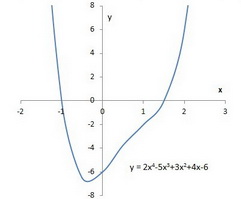You use the rational root theorem and the quadratic formula to find the roots.
#f(x) = 2x^4-5x^3+3x^2+4x-6#
According to the rational root theorem, the rational roots of #f(x) = 0# must all be of the form #p/q#, with #p# a divisor of the constant term #-6# and #q# a divisor of the coefficient #2# of #x^4#.
So the only possible rational roots are:
#±1, ±2, ±3, ±6, ±1/2, ±3/2#
By trial and error, we find:
#f(-1) = 2+5+3-4-6 = 0#
#f(3/2) = 2(3/2)^4-5(3/2)^3+3(3/3)^2+4(3/2)-6#
#= 2(81/16)-5(27/8)+3(9/4)+4(3/2)-6 = 81/8-135/8+27/4+12/2-6 = (81-135+54+48-48)/8 = 0#
So #x = -1# and #x = 3/2# are roots of #f(x) = 0#, and #(x+1)# and #(x-3/2)# are factors of #f(x)#.
Divide #f(x)# by #(x+1)(x-3/2) = x^2+5/2x+3/2# to find:
#(2x^4-5x^3+3x^2+4x-6)/( x^2+5/2x+3/2) = 2x^2-4x+4 =2(x^2-2x+2)#
#f(x) = 2(x+1)(x-3/2)(x^2-2x+2) = (x+1)(2x-3)(x^2-2x+2)#
Using the quadratic formula, we find that the roots of #x^2-2x+2 = 0# are:
#x = (-(-2)±sqrt((-2)^2-4×1×2))/(2×1) = (2±sqrt(4-8))/2 =(2±sqrt(-4))/2 = (2±2i)/2 = 1±i#
The zeroes of #f(x) = 2x^4-5x^3+3x^2+4x-6# are #x = -1, x = 3/2, x = 1-i#, and #x = 1+i#.



